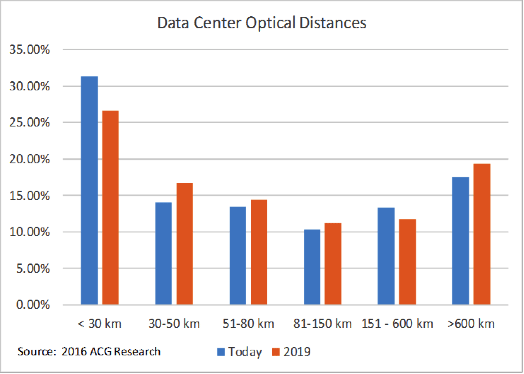Service providers are taking their data centers to the edge and transforming data center interconnect along the way
At this year’s Mobile World Congress in Barcelona, Spain, mobile edge computing was front and center in many presentations and company messages. The European Telecommunications Standards Institute formed an Industry Specification Group for MEC in 2014. In the emerging era of “5G” and the “internet of things,” pervasive connectivity and always-on applications such as medical, agriculture and the connected home will require localized (think edge) storage, computation and analysis to meet users’ expectations and networking demands. We see MEC and the mobile edge as an initiative that will move cloud computing toward the radio access network and accelerate data center growth.
We also see the rise of the edge data centers with companies such as EdgeConneX moving content and the cloud closer to the customer to enable internet service providers and content delivery networks to reduce latency and buffering times, lower transportation costs and improve the overall end-users’ experience. In a webinar in early 2016, EdgeConneX provided quantifiable examples correlating reductions in webpage loading times and video buffering rates with reductions in end-user abandonment and increased video viewership times.
In order to dig deeper into the trends and directions that service providers are taking in the deployment of their data centers and more specifically their interconnection, ACG Research developed and executed a data center interconnect survey and research report in Q1 2016, across four service provider segments: network service providers, cloud service providers, internet content providers and interexchange providers.
While the results confirmed some of our existing beliefs, there were also some surprises. We reconfirmed our belief that the number of data centers will grow approximately 60% between 2016 and 2019/2020. We were a little surprised to see only modest changes in the optical reach needed to interconnect data centers today (2016) and in 2019. As figure 1 indicates, the distribution is bimodal with maxima in the sub-30 kilometer range (metro distributed data centers) and above 600 km (long haul). As Master Yoda says, “difficult to see the future is.” In this particular case, we believe it is difficult for service providers to predict the 2019 optical reach landscape as edge data centers and MEC are both in their infancy, and many service providers’ data center strategies remain quite fluid.

As we begin to connect billions of IoT devices, continuously and pervasively collect big analytics data and increase our reliance on video to tell our stories, share our lives and entertain us, the emergence of mobile edge computing and the edge data center will change our networks and the data center interconnect infrastructure necessary to support it.
To obtain your copy of the 2016 DCI Survey and Report or to learn more about ACG Research’s practice areas, contact ACG Research at sales@acgcc.com. Tim Doiron, principal analyst and research study author, can be reached at tdoiron@acgcc.com. ACG’s website is at www.acgcc.com.
Editor’s Note: Welcome to Analyst Angle. We’ve collected a group of the industry’s leading analysts to give their outlook on the hot topics in the wireless industry.

